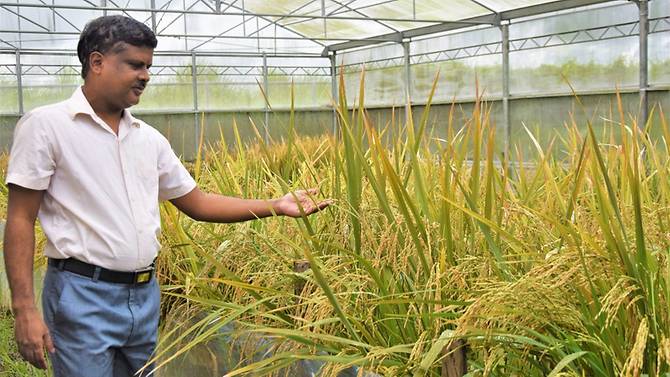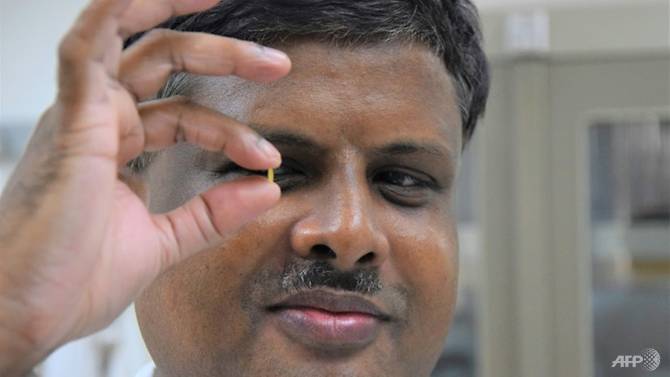November 27, 2025 | 20:54 GMT +7
November 27, 2025 | 20:54 GMT +7
Hotline: 0913.378.918
November 27, 2025 | 20:54 GMT +7
Hotline: 0913.378.918

This handout photo taken in July 2021 shows golden rice breeder Mallikarjuna Swamy examining golden rice at the IRRI transgenic screenhouse in Los Banos, Laguna province, south of Manila. Photo: AFP
A biosafety permit issued by government regulators paves the way for the rice - enriched with the vitamin A precursor beta-carotene to make it more nutritional - to be grown by farmers across the country, its developers said.
"It's a really significant step for our project because it means that we are past this regulatory phase and golden rice will be declared as safe as ordinary rice," Russell Reinke of the Philippine-based International Rice Research Institute (IRRI) told AFP ahead of the announcement.
The next step was to "take our few kilos of seed and multiply it ... so it can be made more widely available", he said.
IRRI has spent two decades working with the Department of Agriculture-Philippine Rice Research Institute to develop golden rice - named for its bright yellow hue.
It is the first genetically modified rice approved for commercial propagation in South and Southeast Asia, officials said Friday.
Golden rice has faced strong resistance from environmental groups opposed to genetically altered food plants. At least one test field in the Philippines was attacked by activists.
Despite passing the final regulatory hurdle, the rice is still a way off appearing in food bowls.
"Limited quantities" of seed could start to be distributed to Filipino farmers in selected provinces next year, Reinke said.
Ordinary rice, a staple for hundreds of millions of people particularly in Asia, produces beta-carotene in the plant, but it is not found in the grain.
"The only change that we've made is to produce beta-carotene in the grain," Reinke said.
"The farmers will be able to grow them in exactly the same way as ordinary varieties ... it doesn't need additional fertiliser or changes in management and it carries with it the benefit of improved nutrition."
Vitamin A is essential for normal growth and development, the proper functioning of the immune system, and vision.

'Golden rice' is enriched with the vitamin A precursor beta-carotene to make it more nutritional. Photo: AFP
World Health Organization data show vitamin A deficiency causes up to 500,000 cases of childhood blindness every year, with half of those dying within 12 months of losing their sight.
Nearly 17 per cent of children under the age of five in the Philippines are deficient in vitamin A, according to IRRI.
"We've always said we will provide 30-50 per cent of that estimated average requirement (of vitamin A), and when you add that to what is existing in the diet you push up a whole cohort of the population from insufficiency to sufficiency," Reinke said.
Golden rice was analysed by food safety regulators in Australia, the United States and Canada and was given the thumbs up, he said, but it has not been approved in these countries for commercial production.
It is also being reviewed by regulators in Bangladesh.
(AFP)

(VAN) A new study reveals how the simultaneous effects of ocean acidification, salinity and loss of oxygen are making the world more fragile.

(VAN) Hopes are growing that the creation of the first 3D turkey gut model could be a turning point in the battle against the virulent blackhead disease.

(VAN) Tyson, America’s biggest meat supplier, plans to shutter one of its largest beef processing plants as the industry continues to struggle with low cattle supplies and political pressure from Washington.

(VAN) New FAO study shows how digital solutions are empowering farmers and fishers to prevent losses and build resilient agrifood systems.

(VAN) Brazil's COP30 presidency pushed through a compromise climate deal on Saturday that would boost finance for poor nations coping with global warming but that omitted any mention of the fossil fuels driving it.

(VAN) Poultry farmers in the UK have been warned that they could face one of the worst winters yet for bird flu.

(VAN) Prices of main-crop paddy have risen sharply, with jasmine rice hitting 16,100 baht per tonne — the highest level in years.